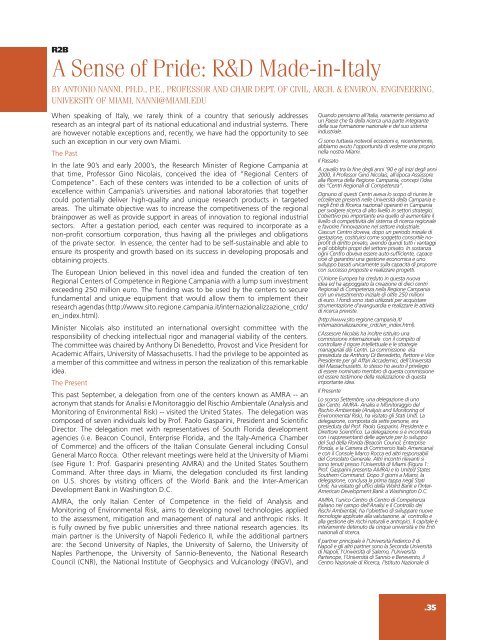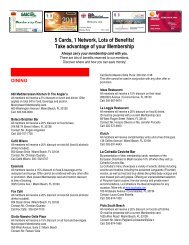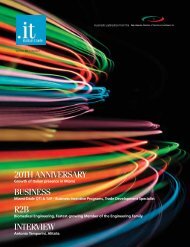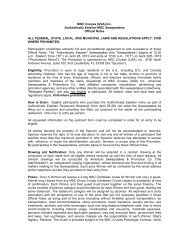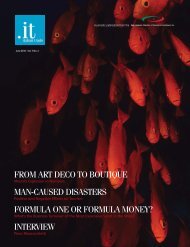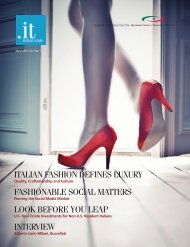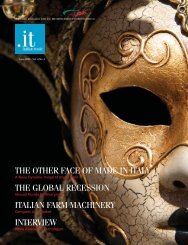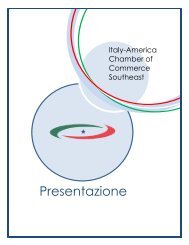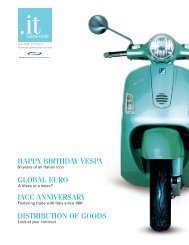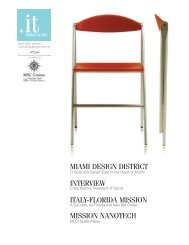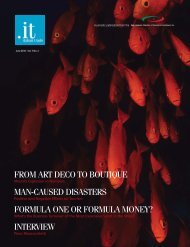la dolce vita, travel style alabama true luxury is simplicity a sense of ...
la dolce vita, travel style alabama true luxury is simplicity a sense of ...
la dolce vita, travel style alabama true luxury is simplicity a sense of ...
Create successful ePaper yourself
Turn your PDF publications into a flip-book with our unique Google optimized e-Paper software.
R2B<br />
A Sense <strong>of</strong> Pride: R&D Made-in-Italy<br />
BY ANTONIO NANNI, PH.D., P.E., PROFESSOR AND CHAIR DEPT. OF CIVIL, ARCH. & ENVIRON. ENGINEERING,<br />
UNIVERSITY OF MIAMI, NANNI@MIAMI.EDU<br />
When speaking <strong>of</strong> Italy, we rarely think <strong>of</strong> a country that seriously addresses<br />
research as an integral part <strong>of</strong> its national educational and industrial systems. There<br />
are however notable exceptions and, recently, we have had the opportunity to see<br />
such an exception in our very own Miami.<br />
The Past<br />
In the <strong>la</strong>te 90’s and early 2000’s, the Research Min<strong>is</strong>ter <strong>of</strong> Regione Campania at<br />
that time, Pr<strong>of</strong>essor Gino Nico<strong>la</strong><strong>is</strong>, conceived the idea <strong>of</strong> “Regional Centers <strong>of</strong><br />
Competence”. Each <strong>of</strong> these centers was intended to be a collection <strong>of</strong> units <strong>of</strong><br />
excellence within Campania’s universities and national <strong>la</strong>boratories that together<br />
could potentially deliver high-quality and unique research products in targeted<br />
areas. The ultimate objective was to increase the competitiveness <strong>of</strong> the regional<br />
brainpower as well as provide support in areas <strong>of</strong> innovation to regional industrial<br />
sectors. After a gestation period, each center was required to incorporate as a<br />
non-pr<strong>of</strong>i t consortium corporation, thus having all the privileges and obligations<br />
<strong>of</strong> the private sector. In essence, the center had to be self-sustainable and able to<br />
ensure its prosperity and growth based on its success in developing proposals and<br />
obtaining projects.<br />
The European Union believed in th<strong>is</strong> novel idea and funded the creation <strong>of</strong> ten<br />
Regional Centers <strong>of</strong> Competence in Regione Campania with a lump sum investment<br />
exceeding 250 million euro. The funding was to be used by the centers to secure<br />
fundamental and unique equipment that would allow them to implement their<br />
research agendas (http://www.sito.regione.campania.it/internazionalizzazione_crdc/<br />
en_index.html).<br />
Min<strong>is</strong>ter Nico<strong>la</strong><strong>is</strong> also instituted an international oversight committee with the<br />
responsibility <strong>of</strong> checking intellectual rigor and managerial viability <strong>of</strong> the centers.<br />
The committee was chaired by Anthony Di Benedetto, Provost and Vice President for<br />
Academic Affairs, University <strong>of</strong> Massachusetts. I had the privilege to be appointed as<br />
a member <strong>of</strong> th<strong>is</strong> committee and witness in person the realization <strong>of</strong> th<strong>is</strong> remarkable<br />
idea.<br />
The Present<br />
Th<strong>is</strong> past September, a delegation from one <strong>of</strong> the centers known as AMRA -- an<br />
acronym that stands for Anal<strong>is</strong>i e Monitoraggio del R<strong>is</strong>chio Ambientale (Analys<strong>is</strong> and<br />
Monitoring <strong>of</strong> Environmental R<strong>is</strong>k) -- v<strong>is</strong>ited the United States. The delegation was<br />
composed <strong>of</strong> seven individuals led by Pr<strong>of</strong>. Paolo Gasparini, President and Scientifi c<br />
Director. The delegation met with representatives <strong>of</strong> South Florida development<br />
agencies (i.e. Beacon Council, Enterpr<strong>is</strong>e Florida, and the Italy-America Chamber<br />
<strong>of</strong> Commerce) and the <strong>of</strong>fi cers <strong>of</strong> the Italian Consu<strong>la</strong>te General including Consul<br />
General Marco Rocca. Other relevant meetings were held at the University <strong>of</strong> Miami<br />
(see Figure 1: Pr<strong>of</strong>. Gasparini presenting AMRA) and the United States Southern<br />
Command. After three days in Miami, the delegation concluded its fi rst <strong>la</strong>nding<br />
on U.S. shores by v<strong>is</strong>iting <strong>of</strong>fi cers <strong>of</strong> the World Bank and the Inter-American<br />
Development Bank in Washington D.C.<br />
AMRA, the only Italian Center <strong>of</strong> Competence in the fi eld <strong>of</strong> Analys<strong>is</strong> and<br />
Monitoring <strong>of</strong> Environmental R<strong>is</strong>k, aims to developing novel technologies applied<br />
to the assessment, mitigation and management <strong>of</strong> natural and anthropic r<strong>is</strong>ks. It<br />
<strong>is</strong> fully owned by fi ve public universities and three national research agencies. Its<br />
main partner <strong>is</strong> the University <strong>of</strong> Napoli Federico II, while the additional partners<br />
are: the Second University <strong>of</strong> Naples, the University <strong>of</strong> Salerno, the University <strong>of</strong><br />
Naples Parthenope, the University <strong>of</strong> Sannio-Benevento, the National Research<br />
Council (CNR), the National Institute <strong>of</strong> Geophysics and Vulcanology (INGV), and<br />
Quando pensiamo all’Italia, raramente pensiamo ad<br />
un Paese che fa del<strong>la</strong> ricerca una parte integrante<br />
del<strong>la</strong> sua formazione nazionale e del suo s<strong>is</strong>tema<br />
industriale.<br />
Ci sono tuttavia notevoli eccezioni e, recentemente,<br />
abbiamo avuto l’opportunità di vederne una proprio<br />
nel<strong>la</strong> nostra Miami.<br />
Il Passato<br />
A cavallo tra <strong>la</strong> fi ne degli anni ’90 e gli inizi degli anni<br />
2000, il Pr<strong>of</strong>essor Gino Nico<strong>la</strong><strong>is</strong>, all’epoca Assessore<br />
al<strong>la</strong> Ricerca del<strong>la</strong> Regione Campania, concepì l’idea<br />
dei “Centri Regionali di Competenza”.<br />
Ognuno di questi Centri aveva lo scopo di riunire le<br />
eccellenze presenti nelle Università del<strong>la</strong> Campania e<br />
negli Enti di Ricerca nazionali operanti in Campania<br />
per svolgere ricerca di alto livello in settori strategici.<br />
L’obiettivo più importante era quello di aumentare il<br />
livello di competitività del s<strong>is</strong>tema di ricerca regionale<br />
e favorire l’innovazione nel settore industriale.<br />
Ciascun Centro doveva, dopo un periodo iniziale di<br />
gestazione, costituirsi come soggetto consortile nopr<strong>of</strong>i<br />
t di diritto privato, avendo quindi tutti i vantaggi<br />
e gli obblighi propri del settore privato. In sostanza<br />
ogni Centro doveva essere auto-suffi ciente, capace<br />
cioè di garantirsi una gestione economica e uno<br />
sviluppo basati unicamente sul<strong>la</strong> capacità di proporre<br />
con successo proposte e realizzare progetti.<br />
L’Unione Europea ha creduto in questa nuova<br />
idea ed ha appoggiato <strong>la</strong> creazione di dieci centri<br />
Regionali di Competenza nel<strong>la</strong> Regione Campania<br />
con un investimento iniziale di oltre 250 milioni<br />
di euro. I fondi sono stati utilizzati per acqu<strong>is</strong>tare<br />
strumentazione d’avanguardia e realizzare le attività<br />
di ricerca prev<strong>is</strong>te.<br />
(http://www.sito.regione.campania.it/<br />
internazionalizzazione_crdc/en_index.html).<br />
L’Assesore Nico<strong>la</strong><strong>is</strong> ha inoltre <strong>is</strong>tituito una<br />
comm<strong>is</strong>sione internazionale con il compito di<br />
control<strong>la</strong>re il rigore intellettuale e le strategie<br />
manageriali dei Centri. La comm<strong>is</strong>sione era<br />
presieduta da Anthony Di Benedetto, Rettore e Vice<br />
Presidente per gli Affari Accademici, dell’Università<br />
del Massachussetts. Io stesso ho avuto il privilegio<br />
di essere nominato membro di questa comm<strong>is</strong>sione<br />
ed essere testimone del<strong>la</strong> realizzazione di questa<br />
importante idea.<br />
Il Presente<br />
Lo scorso Settembre, una delegazione di uno<br />
dei Centri, AMRA- Anal<strong>is</strong>i e Monitoraggio del<br />
R<strong>is</strong>chio Ambientale (Analys<strong>is</strong> and Monitoring <strong>of</strong><br />
Environmental R<strong>is</strong>k), ha v<strong>is</strong>itato gli Stati Uniti. La<br />
delegazione, composta da sette persone, era<br />
presieduta dal Pr<strong>of</strong>. Paolo Gasparini, Presidente e<br />
Direttore Scientifi co. La delegazione si è incontrata<br />
con i rappresentanti delle agenzie per lo sviluppo<br />
del Sud del<strong>la</strong> Florida (Beacon Council, Enterpr<strong>is</strong>e<br />
Florida, e <strong>la</strong> Camera di Commercio Italo Americana)<br />
e con il Console Marco Rocca ed altri responsabili<br />
del Conso<strong>la</strong>to Generale. Altri incontri rilevanti si<br />
sono tenuti presso l’Università di Miami (Figura 1:<br />
Pr<strong>of</strong>. Gasparini presenta AMRA) e lo United States<br />
Southern Command. Dopo 3 giorni a Miami, <strong>la</strong><br />
delegazione, conclusa <strong>la</strong> prima tappa negli Stati<br />
Uniti, ha v<strong>is</strong>itato gli uffi ci del<strong>la</strong> Wolrd Bank e l’Inter-<br />
American Development Bank a Washington D.C.<br />
AMRA, l’unico Centro di Centro di Competenza<br />
Italiano nel campo dell’Anal<strong>is</strong>i e il Controllo dei<br />
R<strong>is</strong>chi Ambientali, ha l’obiettivo di sviluppare nuove<br />
tecnologie applicate al<strong>la</strong> valutazione, al controllo e<br />
al<strong>la</strong> gestione dei r<strong>is</strong>chi naturali e antropici. Il capitale è<br />
interamente detenuto da cinque università e tre Enti<br />
nazionali di ricerca.<br />
Il partner principale è l’Università Federico II di<br />
Napoli e gli altri partner sono <strong>la</strong> Seconda Università<br />
di Napoli, l’Università di Salerno, l’Università<br />
Partenope, l’Università di Sannio e Benevento, il<br />
Centro Nazionale di Ricerca, l’Istituto Nazionale di<br />
.35


